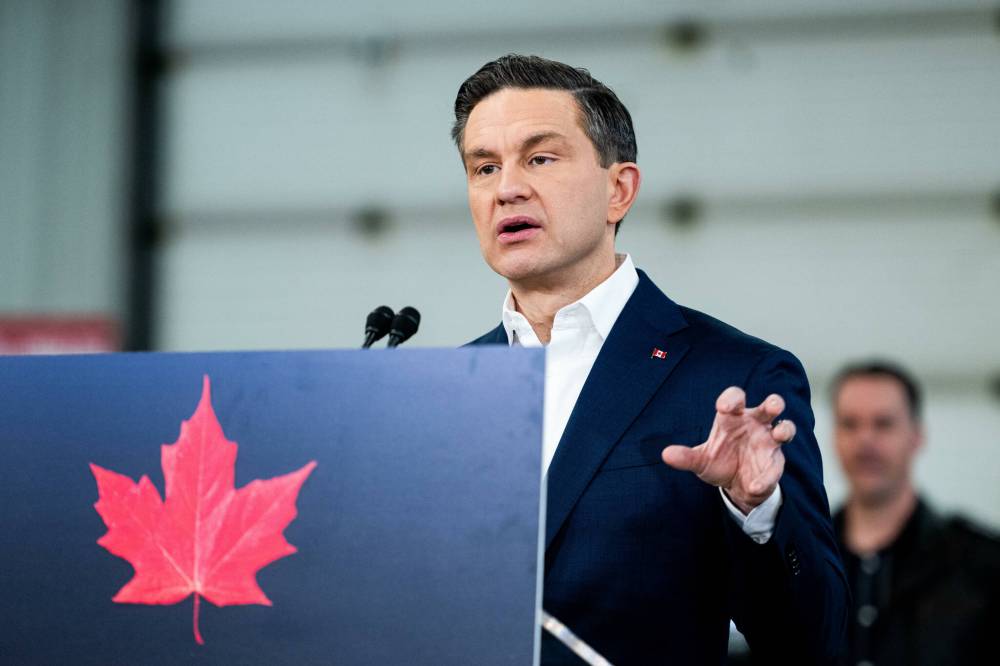Does Poilievre have the tools to stay on?
Advertisement
Read this article for free:
or
Already have an account? Log in here »
To continue reading, please subscribe:
Monthly Digital Subscription
$0 for the first 4 weeks*
- Enjoy unlimited reading on winnipegfreepress.com
- Read the E-Edition, our digital replica newspaper
- Access News Break, our award-winning app
- Play interactive puzzles
*No charge for 4 weeks then price increases to the regular rate of $19.00 plus GST every four weeks. Offer available to new and qualified returning subscribers only. Cancel any time.
Monthly Digital Subscription
$4.75/week*
- Enjoy unlimited reading on winnipegfreepress.com
- Read the E-Edition, our digital replica newspaper
- Access News Break, our award-winning app
- Play interactive puzzles
*Billed as $19 plus GST every four weeks. Cancel any time.
To continue reading, please subscribe:
Add Free Press access to your Brandon Sun subscription for only an additional
$1 for the first 4 weeks*
*Your next subscription payment will increase by $1.00 and you will be charged $16.99 plus GST for four weeks. After four weeks, your payment will increase to $23.99 plus GST every four weeks.
Read unlimited articles for free today:
or
Already have an account? Log in here »
Hey there, time traveller!
This article was published 01/05/2025 (216 days ago), so information in it may no longer be current.
It goes without saying that the 2025 federal election has given everyone involved in the campaign plenty to ponder.
Prime Minister Mark Carney is no doubt marvelling at that which he has achieved: dragging a flailing Liberal Party from the brink of electoral annihilation to the unlikeliest of victories and a rare fourth consecutive term in power. True, the outcome was largely propelled by the distant antagonisms of the volatile U.S. president, but the magnitude of the accomplishment merits reflection nonetheless.
Jagmeet Singh, meanwhile, must absorb the reality that the NDP’s official-party status evaporated at the same time his political career did. Bloc Quebecois Leader Yves-Francois Blanchet must come to terms with his supporters’ “lending” of their votes to the Liberals in an effort to block an unpopular alternative, thereby reducing the Bloc’s parliamentary caucus by one-third, and Green Party co-leader Elizabeth May is likely mulling over the solitude that awaits her in Ottawa as her movement’s sole remaining elected member.

THE CANADIAN PRESS/Spencer Colby
Conservative Party Leader Pierre Poilievre
But it can fairly be argued that no one has more to contemplate this week than Conservative Leader Pierre Poilievre. For him, the election delivered an intricately woven tapestry of messages — some to be embraced, others to be absorbed, but none to be ignored as he considers his path forward as the leader of a party whose quest for control of the levers of power remains unfulfilled.
Just four months ago, it seemed unthinkable that the next federal election would deliver anything other than a massive Conservative majority. Owing mostly to the public’s deepening disenchantment with a prime minister who had clearly overstayed his welcome, Poilievre was riding the crest of a 25-point polling advantage and seemed poised to ascend.
But then … Justin Trudeau finally got the message; his abrupt resignation, combined with the unforeseen aggressions and erraticisms of newly reinstalled U.S. President Donald Trump, jolted Canadians’ political sensibilities and inspired a (temporary) shared sense of unity and purpose, reframing the campaign conversation once Carney had been installed as interim prime minister and promptly called an election.
Poilievre seemed unable — or, at very least, unwilling — to amend his messaging; familiar laments of a “broken” country and the rote recitation of pithy slogans and schoolyardish nicknames ceased to resonate with a public eager for a leader focused on being Canada’s champion rather than its complainer-in-chief.
Instead of a Poilievre coronation, voting day brought Conservatives yet another term in the Opposition benches. The result was far from a complete disaster; the party’s share of the popular vote (41.3 per cent) and its seat count (144) might, under different circumstances, have been enough to guarantee a majority win.
In this decidedly binary-choice election, however, what they delivered was another second-place finish. But the more emphatic message for Poilievre hit much closer to home: as the ballots were tabulated in Ontario, it became clear that many voters there had embraced the Conservative message; the party made substantial gains in the Greater Toronto Area, but Poilievre suffered a startling defeat in the Carleton riding he has represented for more than two decades.
Regardless of whatever good news he might glean from the party’s robust (albeit unsuccessful) performance, Poilievre must think long and hard about the very personal rebuke he has been handed. He seems determined to remain in place as Conservative leader, but there are sure to be questions from within caucus and the party’s broader membership about whether he possesses the tools, humility and adaptability required to produce a better result the next time around.
Voters in Carleton have certainly made their views known on the matter.


